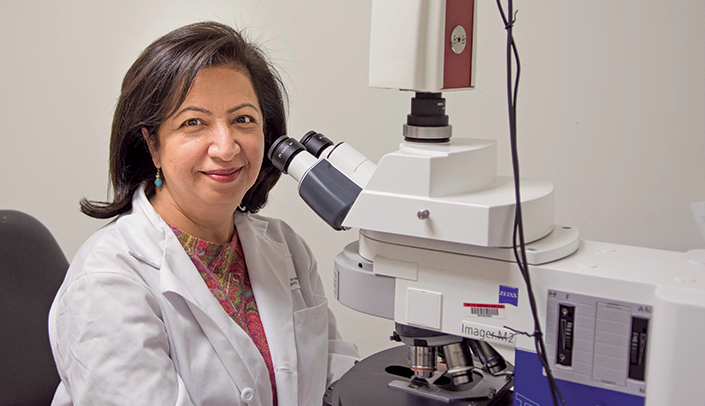Shilpa Buch, Ph.D., is enjoying the ride.
“Science is a joyous obsession. I’m actually being paid to have fun,” she chuckles.
Well, not really. Dr. Buch is being paid to be a top-notch researcher, something she has done so well that she was recently honored as UNMC’s 10th Scientist Laureate.
“Clearly, this award is not just for me,” Dr. Buch said. “It is an award I proudly share with my team. Without their tenacious diligence and hard work, this honor would not have been possible.”
There’s no doubt Dr. Buch’s team is as good as she says. But, as she accepted the highest honor awarded to researchers by UNMC, university leaders lauded Dr. Buch for her vision, leadership and innovation.
“The imprint she has made in science and in mentoring has just begun,” said Howard Gendelman, M.D., chair of the UNMC Department of Pharmacology and Experimental Neuroscience.
It’s been seven years since Dr. Buch, a professor of pharmacology and experimental neuroscience in the College of Medicine and director of The Nebraska Center for Substance Abuse Research, joined UNMC, and her impact has been palpable.
“She is the epitome of what the Scientist Laureate Award is intended to recognize,” said Brad Britigan, M.D., dean of the UNMC College of Medicine.
Dr. Buch credits her parents for instilling in her the ethics of hard work and perseverance that led to her success.
“To this day my mother continues to work and when asked to slow down, chides, ‘Hey you’ve got to have a purpose to wake up in the morning, get dressed and be present,'” she said. “So, the spirit of working hard already was encoded in my DNA long before I was born.”
And it was nurtured, she said, by “many that I met along the way.
As the saying goes, ‘It takes a village …’ I am blessed to have a terrific family who is my critic as well as my personal therapist, terrific mentors as role models, great colleagues to bounce ideas, and, of course, close friends that are my lifeline. Each and every one, in their own unique way, has been a source of inspiration and an anchor in my life.”
For the past decade, Dr. Buch has focused her research interest in exploring how drugs of abuse potentiate HIV-associated complications of the central nervous system (CNS).
“Although antiretroviral therapy has dramatically improved the health of millions of those living with HIV, the limited penetration into the CNS of such therapies has paradoxically resulted in increased
prevalence of milder forms of neurocognitive disorders,” Dr. Buch said.
“So while the advent of antiretrovirals has transformed AIDS into a chronic, manageable disease, premature aging and complications of the CNS are now a growing problem. Adding further complexity to this is the fact that HIV and drug addiction are intertwined epidemics. Our research is focused on exploring the combinatorial effects of drugs of abuse, such as cocaine or opiates, on neurocognition in HIV patients, using complementary experimental and preclinical models,” she said.
Dr. Buch likened HIV to a “ticking time bomb waiting to explode – since once inside the body, HIV continues to integrate in the host genome.
“There is an urgent need to develop adjunctive therapies that can help HIV-infected people live better lives and eventually cure HIV.
We are looking at one such factor, platelet-derived growth factor, or PDGF, which has shown promise in cell culture and preclinical models to reverse HIV-mediated neuronal injury. We are now focusing our efforts to deliver and target this protein into the brain. “
Understanding the toxic effects of drug abuse and how they mediate addiction also is an area of interest in Dr. Buch’s lab.
“It has long been recognized that addiction, which is a chronic brain disease, often leads to relapse,” she said. “One of the main reasons for this is that we do not have effective therapies for treating addiction.
The translation from research into the clinical realm has not happened effectively in the drug addiction field, and this is a big roadblock and a gap in the field. Our work is focused on unraveling the molecular pathways by which drugs of abuse hijack the host to alter brain chemistry and rewire pathways of the brain. Unless we understand the molecular mechanisms by which these drugs cause addiction, the development of translational therapeutic targets will not move forward.”
Dr. Buch calls UNMC a “hidden jewel” that is coming of age.
“I knew that the HIV program here at UNMC was second to none, which was the impetus for my decision to move from Kansas,” she said. “What surprised me was that there was so much more – the collegial scientific environment, the infrastructure, state-of-the-art research and a commitment to improve health outcomes for all. I feel very settled and at the same time very charged in this dynamic scientific environment.
“UNMC fosters a robust research environment,” she said. “We are in the process of recruiting, building and growing, when some of the top institutes are actually facing a mass exodus due to the drying up of NIH funds.
“Our strengths are our vision and our collaborative and multidisciplinary research where innovation fuels discovery. We are at the forefront of HIV research, transplantation medicine, developmental neuroscience, genomics and cancer among others. These are exciting times for all. It is the strong leadership with a vision for the future that forms the basis for fostering this dynamic environment.”
